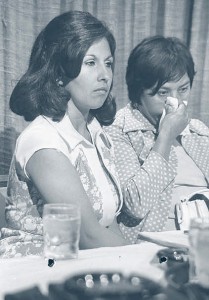Spotlight on: Rene Tajima-Peña
Two -Time CCH Grant Awardee Wins Gugenheim Fellowship for Her Documentary Films

In the 1960s and 70s, claims of coercive sterilization of women were being made all over the country. The most well-known allegations of widespread sterilization involved Puerto Rican women. In the 1980s, reports of poor African-American and white women having been coerced into medically unnecessary sterilization in the South surfaced in mainstream media.
Council grant awardee Renee Tajima-Peña is currently filming ¿Más Bebés?, a documentary which explores allegations of coercive sterilizations of Mexican American women here in California—at Los Angeles County-USC Medical Center—in the 1960s and 1970s. The charges resulted in a class-action suit by a group of the sterilized women.
“There’s been very little produced, media-wise, on this topic,” said Tajima-Peña, who runs the Graduate Program in Social Documentation at UC Santa Cruz. “No one has talked to all the people involved—including the mothers who experienced sterilization and the health care providers, who would argue that the women they operated upon consented to the procedures.”
¿Más Bebés?, a collaboration with oral historian Dr. Virginia Espino of the UCLA Center for Oral History Research, aims to uncover the story and contextualize it by examining the history of the eugenics movement in California and issues related to immigration. “There was fear of a population explosion at that time,” said Tajima-Peña. “US and Western governments were financing programs to reduce the population of the poor.”
Tajima-Peña, Espino, and their advisors have been doing original research and planning work on the documentary for several years. In 2008, Tajima-Peña was awarded a California Documentary Project (CDP) grant by the Council for research and development. This year, she was awarded a $50,000 CDP production grant and is now shooting the film. “It all began with a CCH grant,” said the filmmaker. “That grant started everything; it got the ball rolling. We now have full funding from places like the Independent Television Service, Latino Public Broadcasting.”
In April, Tajima-Peña won a prestigious 2011 Guggenheim Fellowship for her work in film and video. She is one of just 180 scholars, artists, and scientists chosen from among 3,000 applicants across the US and Canada.
Tajima-Peña explains that many of the films she has made are grounded in the humanities and social sciences. Among them are the Academy Award nominated 1987 documentary Who Killed Vincent Chin? and My America…or Honk if you Love Buddha, which won the Eastman Kodak Award at the Sundance Film Festival.
Her students at UCSC learn to work from a social sciences and history basis to inform their documentaries. “The goal is strong storytelling but they also do deep research, learn the larger context, and look between the lines,” said Tajima-Peña. “Scholars—humanists—have a lot to offer to filmmakers in terms of looking at things in a complex, nuanced way. They help us see beyond what’s anecdotal, and understand the larger meaning of people’s lives or moments in history.”
“Filmmaking is so collaborative. Why not bring all the resources to the table?” asked Tajima-Peña, noting that the state humanities councils and the NEH have connected artists and academics for years. “This process that CCH supports, of filmmakers and other project directors working with humanities scholars, has laid a lot of groundwork. When filmmakers and humanities scholars work together, the input is both creative and intellectual and the output is far-reaching. Especially today, when filmmakers think in terms of creating content that’s reversioned on multiple platforms and for multiple uses.”
The co-producers’ plans for ¿Más Bebés? include more than the film. People will be able to access research and contextual information for the documentary online. Their research material will go to UCLA’s Chicano Studies Research Center sterilization archive.
“The only way you can get support for projects like ours is from places like the California Council for the Humanities,” said Tajima-Peña. “They want complexity. They want the depth, the layers, the context. In the rest of medialand, finding support for that is really hard.”
Reprinted from the California Council for the Humanities “Network” newsletter Summer Edition 2011. To support and learn more about the Council’s California Documentary Project program and grants, visit www.calhum.org.